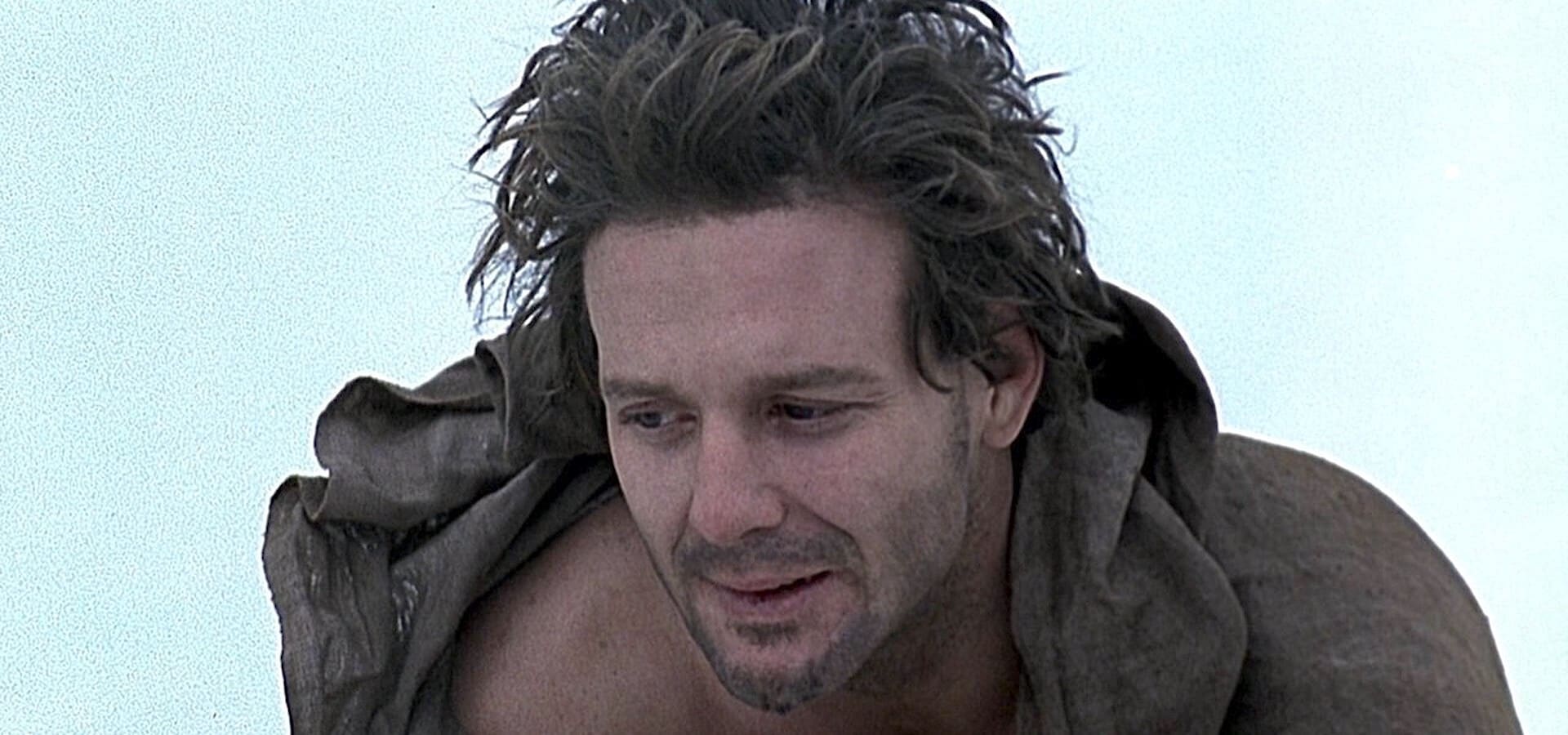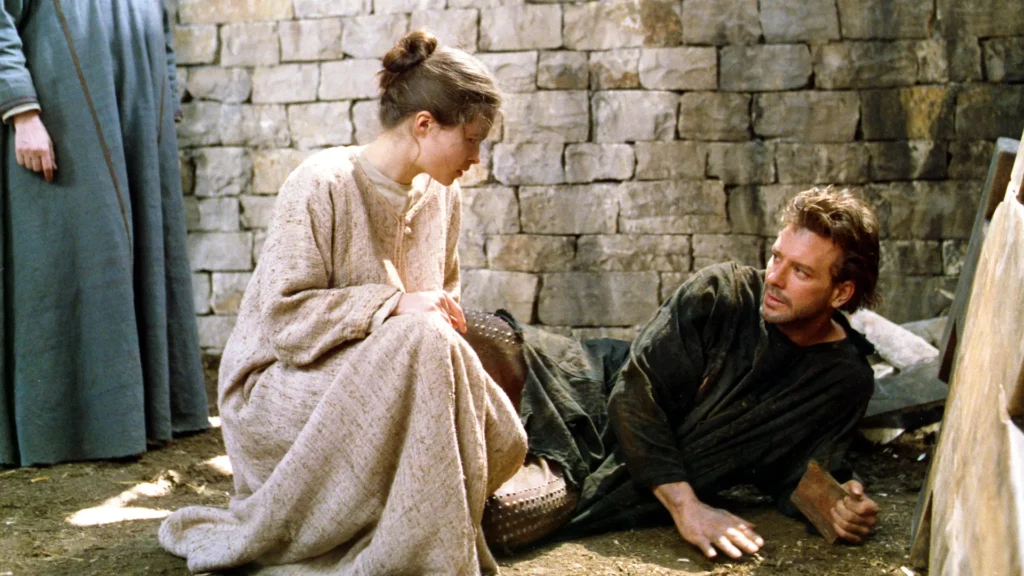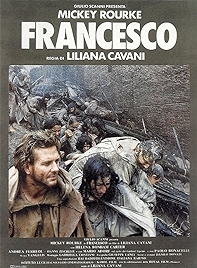So who wants to see Mickey Rourke playing St Francis of Assisi? Not many people is the answer. Liliana Cavani’s Francesco wasn’t a box office hit when it debuted in 1989, didn’t rake in awards at the festivals and has largely disappeared without trace. But Mickey Rourke dressed in a simple brown habit as the founder of the Franciscan order of monks, isn’t that an offer too good to refuse?
In flashback, it’s the story of the Italian Francis, or Francesco, told by a group of disciples who have gathered after his death to get down on paper/parchment/vellum/whatever the remarkable story of the man they had followed. As they pick over the facts of their leader’s life story, we learn that Francis was the son of a wealthy cloth merchant who could have continued being an international, sex-pest playboy – 13th-century-style – but instead renounced everything to live in absolutely austerity, taking Jesus at his word and turning his back entirely on worldly goods.
Francis/Francesco (his name was actually Giovanni, but let’s not get into that) got under the skin of the authorities of the Catholic Church who, one scene explains, were used to dealing with nutjobs like this every day of the week. One day they’re following Jesus, one cardinal grumbles, the next day they are Jesus.
But, in spite of the fact that renunciation isn’t the way the Church operates, the pope and his self-satisfied, all-too-worldly cardinals do eventually and grudgingly admit that this ragged evangelist might have something. They are impressed by his sincerity, and because Francis falls back repeatedly on the teachings of the Gospel, even if they were against him he’s a hard one to call out. Also, perhaps more importantly, Frances is so modest that he poses no real threat.
In snapshot scenes and with a fluid camera, Cavani follows the man from his swaggering, opulent old life, through his breakaway moment, to living on the streets begging, to building up a following, through sickness and terrible suffering, until God gives Francis an indication of his pleasure by blessing him with stigmata, the five wounds of the crucified Jesus: one in each foot, one in each hand, one in the side.
There is a touch of those drama-free Bible movies about Cavani’s retelling of the story, but she comes across as sincere. This is a heartfelt drama and there is clearly some affection for her subject – Cavani had told his story before, in her 1966 debut, Francesco di Assisi, and would tell again in 2014’s Francesco. In case you’re wondering, it’s a world away from her most famous film, 1974’s The Night Porter, in which a concentration-camp survivor (Charlotte Rampling) enters into a weird sado-masochistic relationship with a former camp commandant (Dirk Bogarde).
There is a touch of the fangirl here, in other words, but it’s more than a Catholic screed. Was Francis really just an egomaniac, or mentally ill, or caught up in a privileged man’s fantasy that got completely out of hand? There are hints of all that in the screenplay, and in the presence of Helena Bonham Carter as Chiara, an early follower who, it’s several times pointed out, has more than saintly feelings for Francis.
And yet for the most part this is the story of a man who was devout and invested in his decision to become a mendicant friar and itinerant preacher.
How fascinating that it is Mickey Rourke playing him. This is the Rourke before the weird decision, in 1991, to go back to the boxing he’d abandoned for acting. That decision, plus injury, plus cosmetic work, changed his face and the course of his career. In 1989 he was just coming off the hot run that had started with Rumble Fish and took in 9½ Weeks, Angel Heart, Barfly and Johnny Handsome (released the same year).
A film about renunciation starring an actor on the point of renouncing the high life to take the rockier road. Was it this movie that provided the push? After all Rourke is and was a practising Catholic.
Those speculations to one side, his performance here is enigmatic and Brando-esque in its display of majestic suffering. It’s one of several real pluses in this mystifying drama. Helena Bonham Carter is another, a strange hybrid of the wanton and the nun, her Chiara (who’d later become Clare, founder of the Francis-inspired Poor Clares) provide a way for Cavani to suggest another side to Francis, or the life he’s given up.
Vangelis’s score is another plus – it shifts from the ominous early on into the positively ethereal later, as Francis’s life shifts towards the saintly. And Cavani’s choice of locations, in Rome, Umbria and Perugia, lend her film authenticity reinforced by the half an eye she has on Pasolini’s The Gospel According to St Matthew – all those peasant faces.
For sure there are too many shots of Francis and his followers in beatific rapture and it’s easy to see Francesco as just another god-bothering would-be Bible movie. But there is nuance. Francis is a man first and a saint second. The man struggles, the saint eventually prevails. It’s a tough journey and Cavani really makes it look like one.
Francesco – Watch it/buy it at Amazon
I am an Amazon affiliate
© Steve Morrissey 2024


